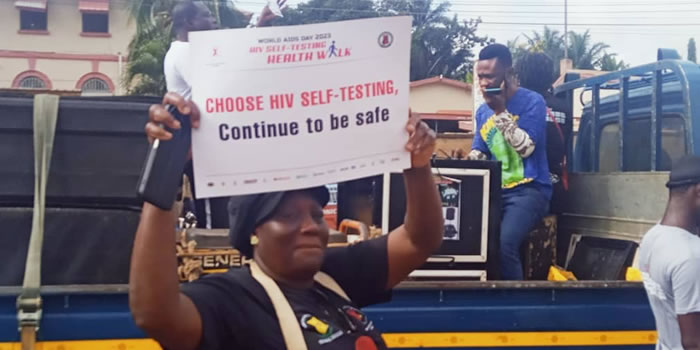Adverts
HEALTH
Ghana AIDS Commission scale up awareness on self-testing kits in Kumasi
Ahead of the global World AIDS Day celebration, the Ghana AIDS Commission and its partners in the Ashanti Region, have scaled-up public awareness about the HIV self-testing kits as a strategy to encourage people to know their status.

Date Created : 11/28/2023 12:00:00 AM : Story Author : Yussif Ibrahim/Ghanadistricts.com
The Commission in collaboration with the Ghana Health Service and Ghana HIV and AIDS Network (GHANET), have organised a health walk to create awareness about the kits, which are free and easy to use in the comfort of one’s home.
The walk, which started at the forecourt of the Kumasi Post Office, ended at the Centre for National Culture after passing through the central business district where participants engaged the public on the importance of knowing one’s status.
With a public address system mounted in the bucket of a mini truck, the public was sensitised on how to use the kits and the next action to take whether the person is positive or not.
Volunteers distributed some of the kits and condoms in the busy streets as they encouraged them to meet the team at the Cultural Centre for further demonstration on how to use the kits.
Madam Olivia Graham, Ashanti Regional Technical Coordinator of GAC, said it had become extremely important to encourage people to do the self-testing to help bring down new infections.
“This is because if one is infected with HIV and we get to know and put the person on treatment, it brings down the virus to undetectable levels and it will be difficult for the person to infect other people,” she explained.
She said there was the need for everyone to know their status to be able to provide treatment to those infected to ensure protection for the larger population.
She mentioned stigma as one of the key reasons why people were reluctant to know their status because of how society treated HIV patients as outcasts and urged the public to desist from that practice.
According to her, a lot of people also believed that not knowing their status gave them peace of mind because the thought of being HIV positive alone could send them to their early grave.
“Once you are infected with HIV and you don’t know it will progress to the AIDS stage, which could be fatal, so it is important that you get to know your status,” she reiterated.
Madam Graham said the self-testing kits had been given to civil society organisations who were promoting them in communities to make them accessible for everyone.
She disclosed that only 60 percent of persons living with HIV in the region were on medication while the remaining forty per cent were either unaware of their status or refusing treatment.
Mr. Dennis Bandoh, the Deputy Regional Focal Person for HIV/AIDS, said the only way to identify HIV cases was through testing and it was for that reason that over 98 per cent of pregnant women who attended antenatal clinics were tested.
He said the strategy was to follow up with their partners in cases where the women tested positive.
With regards to treatment, he said positive cases were linked to care at the over 90 antiretroviral treatment centres across the region.


 facebook
facebook X (twitter)
X (twitter) Youtube
Youtube +233 593 831 280
+233 593 831 280 0800 430 430
0800 430 430 GPS: GE-231-4383
GPS: GE-231-4383 info@ghanadistricts.com
info@ghanadistricts.com Box GP1044, Accra, Ghana
Box GP1044, Accra, Ghana